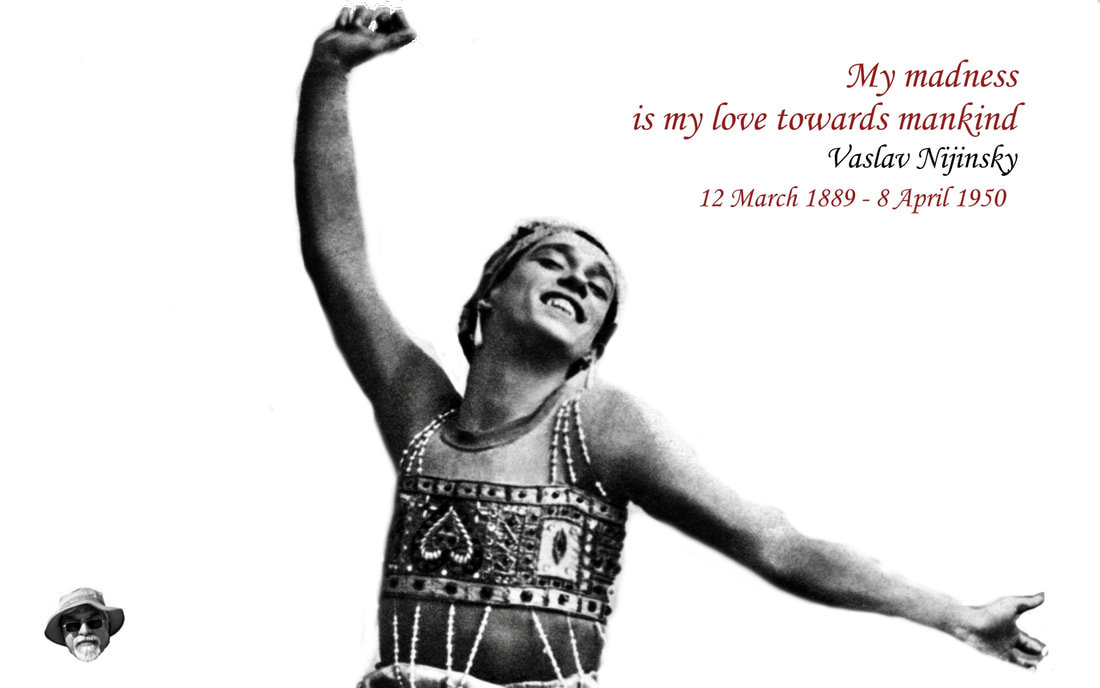Nijinsky kept a meticulous account of his psychological travails in a diary which he wrote within a short span of six weeks. I read his poignant account when he was in the cusp of sanity and mental illness, in the Internet Archives. It was quite a difficult read and a revealing account of early stages of decline into a psychotic breakdown. For instance, in an accurate account of delusion of influence, he wrote “I write without thinking. I scratched my nose, thinking something was tickling me, but I realised that God did this on purpose so that I would correct my notebook. God writes all this for me”.
I delved deeper into his mental illness through various sources. He was first taken to Eugene Bleuler at the Burgholzli. After examining him, Bleuler came out and told his wife Romola, “Now, my dear, be very brave. You have to take your child away; you have to get a divorce. Unfortunately, I am helpless. Your husband is incurably insane. I must seem to be brutal, but I have to be able to save you and your child – two lives. We physicians must try to save those whom we can; the others, unfortunately, we have to abandon to their cruel fate. I am an old man. I have sacrificed fifty years of my life to save them. I have searched and studied; I know the symptoms; I can diagnose it; but I don’t know. I wish I could help, but do not forget, my child, that sometimes miracles happen”. When Romola came out after the consultation, Nijisnsky’ response was “you are bringing me my death-warrant”.
As he became quite symptomatic, he was forcibly taken to the Sanatorium Bellevue Kreuzlingen, where he was treated by Dr Binswanger. Romola took her husband to be examined by Jung and Sigmund Freud. Freud opined that psycho-analysis was useless in cases of schizophrenia.
In spite of being taken care of by the giants in the history of psychiatry, he grew worse, continued to have hallucinations and was violent at times. Hoping for a miracle, Romola took him on a pilgrimage to Lourdes. “We spent several days there,” she wrote. “I went with Vaslav to the Grotto. I washed his forehead in the spring and prayed. I hoped and hoped, but he was not cured. Maybe my faith was not deep enough”.
That year Romola heard about some new treatment approaches in schizophrenia and got in touch with Dr Sakel, who had invented insulin coma treatment. It was arranged that Sakel himself should administer the treatment. Bleuler, who saw him twenty years earlier, paid him a visit after 20 years and told Romola,”‘My dear Madame Nijinsky, many years ago I had the cruel task of informing you that, according to medical knowledge as it then was, your husband was incurably insane. I am happy today to be able to give you hope. This young colleague of mine has discovered a treatment for which I searched in vain for over forty years. I am proud of him. And of you, because you did not follow the advice I gave you so many years ago to divorce your husband. You stood by him during those years of mental dimness, you helped him through this terrible illness, and now I believe you will be rewarded. He will once more become himself.” The insulin shock had freed him from hallucinations and his restlessness abated significantly.
Unfortunately Nijinsky never fully recovered from his illness.The Nazi regime gave orders to exterminate all psychiatric patients and he had to hide in a cave. After the war, he and Romola moved to London. He never saw any psychiatrist nor did he required admission during his time in the UK. He passed away on 8 April 1950 due to ‘uremia with chronic nephritis’.
Most of the accounts about Nijinsky focus on his illness and the kind of treatment he received. What is missing in these narratives is the crucial role played by his wife Romona. Nijinsky was not an easy person to handle during his psychotic episodes and at times even became physical. Once during their walks in the mountain, Nijinsky suddenly pushed her and she narrowly missed falling into a precipice. She gathered herself, put her around him, remembering Bleuler’s advice that “one should never lose one’s nerve when a mental patient becomes agitated or violent; on the contrary, then one must show utter fearlessness.”
She was constantly by his side, tending to him with affection, “Every afternoon I tried to interest Vaslav in small and simple matters, things which were related to his art, his youth or his hobbies. At first, it was an extremely thankless task. His tendency was to withdraw into himself…One had to draw his attention to something and then sustain it. It might be a rose in the garden, which I would show him and make him gather”.
Nijinsky died in the presence of the woman who had been for thirty-seven years his wife, breadwinner, nurse and a second mother. In his final moments, he stretched out his right hand to Romona, who bent down and kissed it; “Thoughts and feelings were racing in my mind, but the enduring thought was: You were privileged among so many millions of women to share his life, to serve him. God gave him to you. He has taken him back.”
Nijinsky’s illness career is a poignant reminder of the suffering associated with schizophrenia and the crucial role of caregivers in tending to those afflicted with it. To have someone who cares at the most difficult and challenging moments in life is truly a blessing.
As Rollo May observed, “Care is a state in which something does matter; it is the source of human tenderness.”
(I personally wish that lived experiences of people with mental illness and the narratives of caregivers find their rightful place in psychiatry textbooks).
Feel free to pen your thoughts here...

 RSS Feed
RSS Feed